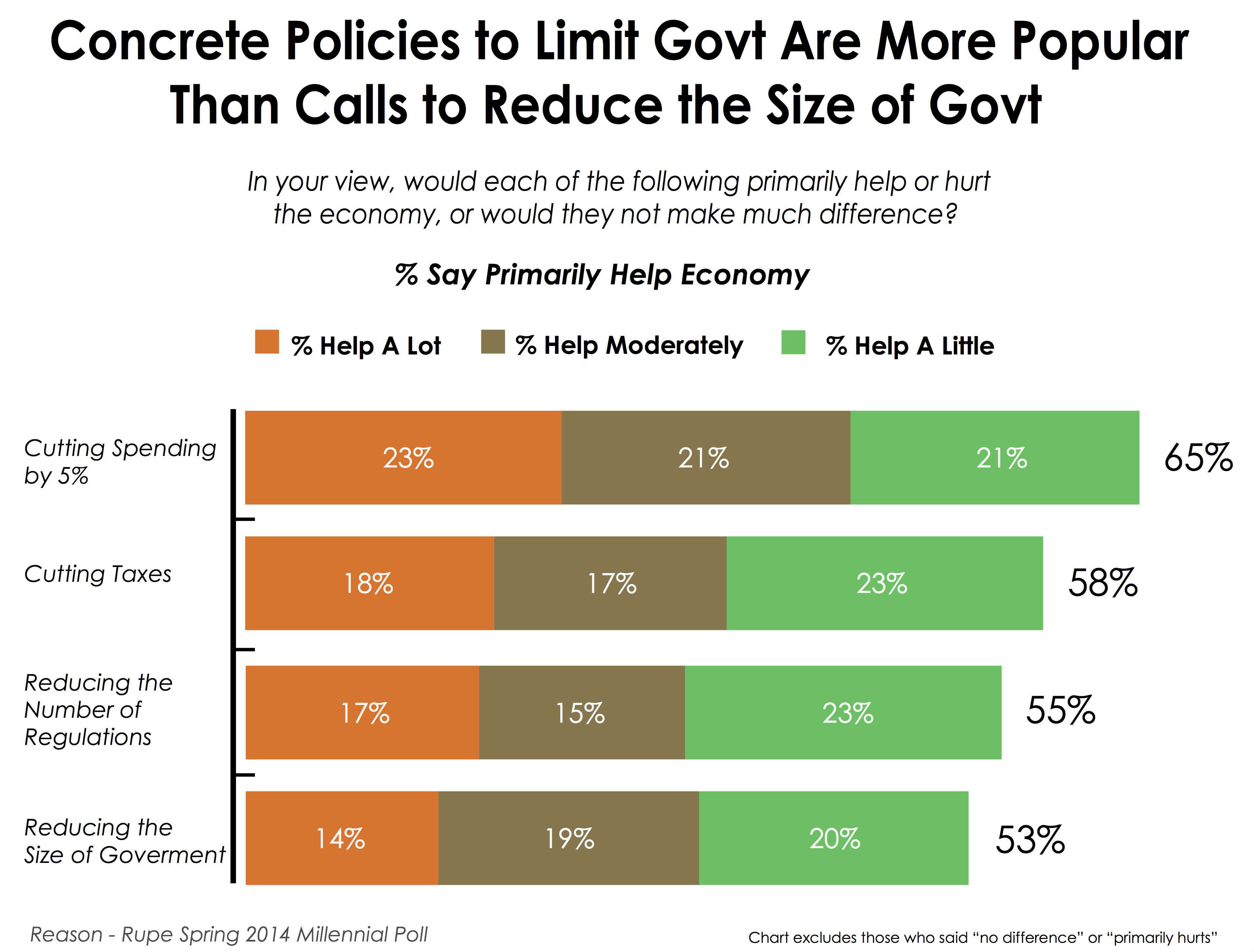Millennials Prefer Small Government If Large Government Requires High Taxes
Reason-Rupe has a new survey and report out on millennials—find the report here.
At first glance millennials appear to prefer a "larger government providing more services" (54%) over a "smaller government providing few services" (43%). However, once tax rates are mentioned support for large government flips. Instead 57 percent favor "smaller government, providing fewer services, with low taxes" and 41 percent want "larger government providing more services, with high taxes." We also find that the race/ethnicity gap on the size of government disappears among Hispanic, Asian, and white millennials once tax rates are explicit.
Other surveys have asked the first version of this question, in which taxes are not mentioned, finding millennials are the only generation to support large government. In stark contrast, Americans nationally favor smaller government with fewer services over larger government providing more services (35%).
Typically, "big government" has implied high taxes, heavy regulation, and the power to play favorites and control individuals. However, debate about the role of government was put on hold in the aftermath of 9/11, when millennials came of a politically impressionable age. Furthermore, the national enemy was no longer a large totalitarian regime like the Soviet Union, but terrorist groups from whose attacks our government sought to protect us.
This raises the question: Do millennials know what the phrase "big government" means? Recent evidence suggests they may not. If millennials don't know what large government is, do they know what it costs? If not, perhaps their preference for "more services" over "fewer services" drives their desire for "larger government."
To investigate this, Reason-Rupe divided the sample in half and asked one half:
"If you had to choose, would you rather have a smaller government providing fewer services, or a larger government providing more services?"
It then asked the other half of the sample the same question but with explicit tax rates:
"If you had to choose, would you rather have a smaller government providing fewer services with low taxes, or a larger government providing more services with high taxes?"
When taxes are mentioned, millennials' preference for large government flips, and a majority (57%)— favor small government and 41 percent favor large government.
Our results indicate that millennials don't immediately make the connection between larger government and the high taxes it requires. Consequently, support for "larger government providing more services" among millennials doesn't necessarily imply an endorsement for a large activist government that levies heavy taxes. Instead, many are favoring "more services" rather than more services plus high taxes. Perhaps older Americans would also favor more over less government services if they felt it wouldn't cost them.
Are Non-white Millennials More Likely To Support Large Government?

Congruent with findings from the Pew Research Center, white millennials (50%) are considerably more likely to favor smaller government when taxes are not mentioned than African-American (32%), Latino (36%), and Asian American (29%) millennials. Consequently, at first glance, non-white millennials are far more likely to favor larger government.
However, after considering taxes, the racial gap on the preferred size of government starts to disappear. The share of Latino, Asian, and white millennials preferring small government is statistically identical, with roughly six in 10 in support. African-American millennials are divided, with a slim majority favoring larger over smaller government, even if that means higher taxes (53 to 46 percent). It appears that white millennials are more likely to implicitly associate large government with high taxes.
Available data suggest that Latino and Asian millennials, many of whom are themselves immigrants or children of recent immigrants, will likely experience a good deal of upward income mobility. For instance, the Pew Research Center reports that the median annual household income for first generation Hispanics is $34,600, and this increases to $48,400 among the second generation. Since higher incomes often diminish support for government services, our results indicate that desire for activist government may decline over the next decade if large government and high taxes are explicitly connected in voters' minds.
Millennials Respond More Favorably to Concrete Proposals to Limit Government Than Abstract References About Government's Size
If the abstract notion of government's "size" does not convey the same substantive meaning for millennials that it has for previous generations, perhaps more concrete policy proposals would garner greater support than calls to "reduce the size of government."
To test this, the survey presented millennials with several policy proposals aimed at reducing the scope of government, including cutting government spending by five percent, cutting taxes, and reducing the number of regulations. They were asked if each proposal would primarily hurt or primarily help the economy. The survey then compared responses for these concrete proposals to responses for whether the relatively abstract act of "reducing the size of government" would primarily help or harm the economy.

Concrete policies that effectually reduce government's scope receive greater support than the proposal to reduce government's size. Cutting government spending receives the greatest support, with 65 percent saying it would "primarily help" rather than harm the economy, followed by cutting taxes (58%), reducing the number of regulations (55%), and reducing government's size (53%). Intensity of support also reflects this pattern, with a quarter of millennials saying that cutting government spending would help "a lot," compared to 14 percent who have a similar favorable intensity for shrinking government.
In sum, cutting spending and taxes garners more support than reducing government's size. Offering explicit methods for how to reduce the power and scope of government may better resonate among millennials than just asserting the need to rein in "big government."
To learn more about millennials, check out Reason-Rupe's new report.


Show Comments (75)